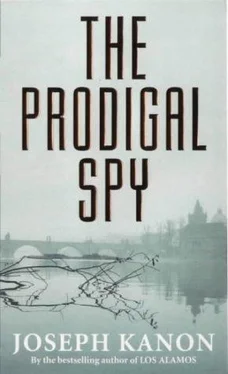His mother nodded, then raised her chin. “My husband didn’t know Miss Cochrane,” she said plainly.
The policemen looked at each other, embarrassed. “Well, we have to talk to everybody. You know. In cases like this. Get some idea what may have been on her mind.”
“That’s one thing we’ve never known.”
In the awkward pause that followed, Nick looked at his mother, surprised at her tone.
“Yes, well, we don’t want to bother you. Just have your husband give us a call when he gets in, would you?” The policeman handed her a card.
His mother took it. “Do you want to talk to his lawyer, Mr Benjamin?”
“No, just have your husband give us a call.”
She jumped when the phone rang, involuntarily glancing at her watch again. “That’s all right, Nora,” she said quickly. “I’ll get it. Excuse me,” she said to the policemen, picking up the phone on the second ring. “Hello. Yes?” Nick couldn’t see her face, but her body leaned into the phone as if she were trying to make physical contact, and Nick knew it was his father. A prearranged contact. Now he understood her distraction. A chance to talk, ruined now by the need to pretend, her voice unnaturally brisk. “Yes, that’s right. Yes.”
She was listening. “No, I’m afraid I can’t.” Would his father know the police were there? Nick wanted to push them out of the room, grab the phone, and tell his father to come back. “I’m sorry, but he’s not here just now. He’s out.” Her voice was odd again, so far from intimacy that Nick knew it must be a message, her own kind of warning. “Yes. Yes, I know.” Now a faint crack, or did only Nick hear it? “He’s fine,” she said, almost softly, and Nick’s heart skipped. His father was asking about him. A pause as the caller talked. “You’ll have to try later,” she said, formal again, her voice rising slightly at the end. “Oh. I see.” Then, finally, her real voice. “Me too.”
She kept her back to them for a minute when she hung up, composing herself, Nick thought, and when she turned he saw that it was only partly successful. She looked the way she had after the bath, slightly drugged and confused. She tried a small smile.
“It seems everyone wants to talk to my husband,” she said apologetically.
“We don’t want to bother you,” the policeman said again, getting ready to go. “What time did you say your husband left?”
“What time?” she echoed weakly. Nick looked up in alarm. She was trying to think what to say again and the call had drained her.
“About eight o’clock,” Nick said suddenly. “He made me cereal first.”
The policeman turned to him, not catching Nora’s surprised expression.
“Eight o’clock? Is that right, Mrs Kotlar?”
“Nick-”
“Mom was still asleep. He didn’t want to wake her.” Nick thought of the shirt, floating down the drains. Now he had lied to the police too.
“Did he say where he was going?”
Nick shrugged. “A meeting, I guess. He took his briefcase.” That was stupid. They’d find it upstairs. “The little one,” he added, digging deeper.
“I see. Eight o’clock. He get a taxi out front?”
Nick saw the trap. They’d already asked the reporters.
“A taxi?” he said, pretending to be puzzled. “No, he went out the back. He always does that when he doesn’t want to talk. To the guys out front. You know.”
The policeman smiled. “No, but I can imagine. Must be like living in a fishbowl here sometimes.” This as a kind of apology to Nick’s mother. “Well, we don’t want to bother you,” he said again, as if he really meant it. “Oh, Mrs Kotlar, one last thing? You didn’t go to the United Charities ball last night?”
“No.”
“You and your husband were in all evening, then?”
He saw his mother waver again.
“We played Scrabble,” Nick said.
“Oh yeah?” the policeman said, friendly.
“I won,” Nick said, wondering if it was another trap. Who would believe that? “My dad lets me win.”
And then they were gone, in a small confusion of thank-yous and promises to call, swallowed up by the reporters’ hats outside.
“That was Dad,” Nick said flatly when he heard the door close. His mother looked at him nervously, afraid to answer. “Is he all right?” She nodded.
“Would someone like to tell me what’s going on around here?” Nora said. “Making cereal,” she added, scoffing.
But his mother’s eyes were filling with tears. “Do you think they knew?” his mother said to him. “I tried-”
“No, just me,” Nick said.
“What?” Nora said again.
“She’s worried about Dad,” Nick said, answering for his mother. “He said he’d be back for lunch.”
Nick’s mother looked up, helpless to correct him.
“Lunch,” Nora said, working at a puzzle.
The phone rang again and Nick’s mother slumped, covering her eyes with one hand. Nick nodded to Nora, who raised her eyebrows and answered it. He led his mother to the couch, sat down beside her, and put one arm around her shoulder.
“When is he going to come back?” he said, almost in a whisper, so Nora wouldn’t hear. His mother shook her head. “But he has to,” Nick said.
“He’s not coming back, Nick,” his mother said wearily. “I wasn’t sure until now.”
Nick looked at her in confusion. “The police will come again. He has to be back before that. They’ll look for him.”
His mother put her hand to the side of his face, shaking her head. “It’s just you and me now. You don’t have to lie for him, Nick. It’s not right.”
But she still didn’t understand; her mind was somewhere away from the immediate danger. “He was here last night,” he said, looking into her eyes. “You have to say that.”
“What are we doing to you?” his mother said in a half-whisper, still holding the side of his face.
“Call Uncle Larry,” Nick said.
“Larry?”
“He’ll know what to say. Before they come back.”
His mother shook her head. “It doesn’t matter,” she said, dropping her hand.
“It does. They’ll blame him. Where is he?”
“I don’t know, Nick.”
“I’m good at secrets. I’ll never tell. Never.”
“So many secrets,” his mother said vaguely. “You don’t understand. I don’t know.”
“But he’s safe?”
She nodded.
“Mr Welles won’t get him?”
She looked at him, and then, as if she were starting to laugh, her voice cracked and she sobbed out loud, so that Nora looked over from the phone table. “No,” she said, her voice still in the in-between place. “Not now. Nobody will.”
“Why not?” Nick whispered, his voice throaty and urgent. “Why not?”
Then she did laugh, the other side of the crying. “He’s gone,” she said wispily, moving her hand in the air. “He’s fled the coop.”
Before Nick could take this in, Nora loomed in front of them, her face white and dismayed.
“I’ll take her upstairs,” Nick said quickly. “She’s upset.” It was his father’s voice.
Nora stared at him, more startled by his self-possession than by his mother’s behavior. When he took his mother’s elbow to lead her out of the room, Nora moved aside, stepping back out of their path.
He led her down the hall, but at the stair railing she stopped, slipping out of his hand. “I’ll be all right,” she said softly, her voice coming back. “I’ll just lie down for a while.”
But Nick stopped her, placing his hand over hers on the rail. “Why won’t they get him?”
His mother turned her head, looking for Nora, then lowered it. “He’s not here,” she said finally. “He’s left the country.”
She took in his wide eyes, then looked nervous again, so that Nick knew she hadn’t meant to tell. He felt lightheaded, the same frightened giddiness as that time when their car had skidded on the ice coming down the hill from the cabin, spinning them sideways. Steer into the slide, his father had said aloud, giving himself instructions, gripping the wheel hard until finally they connected with the road again and he heard the solid crunching of snow. There wasn’t time to think, just to steer.
Читать дальше












